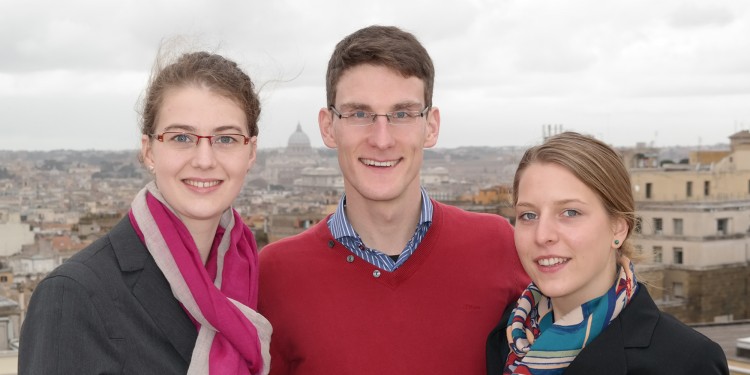
Catholics advocate the recognition of different realities of life
At first, it was only meant to be a small contribution to an initiative started by Pope Francis to conduct a survey entitled "Ask the Faithful!" But then the reaction to the questionnaire (www.soscisurvey.de/synod2015/) sent out by theology students Anna and Tobias Roth (University of Münster) and Sarah Delere (Free University of Berlin) exceeded all expectations, regarding both scope and content. There were more than 12,000 replies from 42 countries on issues such as the treatment of divorced people who remarry and same-sex partnerships, celibacy and women deacons. The response provides a comprehensive and interesting insight into the spiritual life of many Catholics. The survey, or study, is entitled "Catholics’ Views on the Ethics of Partnerships and Images of the Family: a Comparative Intercultural Study on the Relationship between Church Teaching, Daily Practice and Socializational Parameters".
"The study can be classified as the largest of its kind," say the three students, "because of the very large number of people who took part in it and its intercultural research design at the interface between Social Sciences and Theology." It is "highly relevant", they add, in particular for dialogue within the Church, because it especially addressed practising Catholics who play an active role in the Church .
The replies – with around 8,000 coming from Germany alone – are not only varied: in many cases they are also surprising. A Christian upbringing for children, getting married in church, and attending church services, for example, are often more popular among the faithful than might be assumed in these secular times. But the very clear advocacy of a more open-minded attitude towards divorced people who remarry, as well as towards celibacy, women deacons and same-sex partnerships are unmistakeable, collective vote against the teachings of the Catholic Church on the part of the Catholics questioned.
The demands contained in the survey and addressed to the Vatican vary in vehemence from country to country. Whereas in Germany there is a desire for the Church to adopt a more liberal attitude towards issues it has so far rejected, those questioned in Poland, southern Europe and Brazil are more conservative at least in reference to several questions. In these countries, for example, the majority rejects any blessing of homosexual couples, while almost three-quarters of those questioned in Germany would like to see such a recognition of such partnerships. In the case of one of the most talked-about issues in the Catholic Church – the treatment of divorced people who remarry – a criticism of the Church’s teaching can be seen in many countries. In Germany almost 90 percent reject any exclusion for these couples from taking Communion, and the results of the survey in other countries are hardly any different (more details, as well as individual survey results, can be found in the attached overview of results).
The starting point for the study, for which the three students travelled to twelve countries as part of a research trip, were the two Surveys on Marriage and Family initiated by the Pope prior to the Synod on Family Life to be held this autumn. The Pope had decided on the survey in order to see to what extent the Church’s teaching corresponds to the daily lives of the faithful. There was a low level of response – in some dioceses there were fewer than 50 replies. Supported by the prestigious Leibniz Institute for Social Sciences ("GESIS") and the Faculty of Catholic Theology at Münster University, the three students drew up their own 26-point questionnaire in seven languages.
Prior to conducting the survey, the team of students also received support from the SAFIR research funding advisory service at Münster University. Prof. Marianne Heimbach-Steins, a theologian and Director of the Institute of Christian Social Sciences in Münster, strongly promoted the students’ "innovative and independent research project" from the start. "The three students designed and conducted a high-quality empirical study," she says, "producing an innovative and challenging contribution to theological discussion on family pastoral care in the Church. In defiance of sceptical expectations as to whether something like this could be at all successful, the international questionnaire met with a splendid response."
